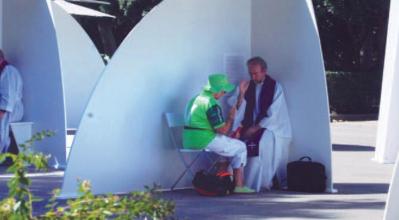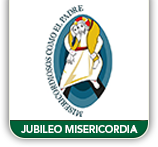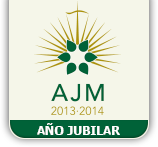Confession, a gift from God. Archbishop’s weekly letter.

ARCHBISHOP’S WEEKLY LETTER
Dear brothers and sisters:
If often meditated on the divine omnipotence reflected in the creation of the world and all God’s interventions over Sacred History, we would be amazed at the wonders worked by God in ancient Israel and us, the new Israel, witness his incarnation, his preaching and miracles, his passion, death, resurrection and sending of the Holy Spirit has been poured into our hearts.
Among all the wonderful works of God in the life of the Church and in our own lives, not less mercy that He exudes with us when we sin and forgives our sins if we confess humbly repentant in the beautiful sacrament of penance, with awareness that God forgives us completely and fully. When we forgive each other, there is always a residue of resentment. God our Lord, however, forgives us completely, without taking account of evil, if we humbly confess our sins to the Church, after a sincere soul, with sorrow of heart and purpose of the amendment.
It is no secret that for years the sacrament of penance is going through a deep crisis. In it, the priests we have an enormous responsibility, as many of us have abdicated paramount obligation, be available to hear confessions, revealing the faithful generous time in which their priests are willing to serve God’s forgiveness . Sometimes we used abusively community celebrations of penance, with general absolution without express and individual manifestation of sin, which means a deception for the faithful, because such confessions are invalid and a blatant disregard of the rules of the Church , referred to repeatedly by the Popes in recent years.
Another cause of the crisis of this beautiful sacrament is the loss of the sense of sin and denounced in 1943 by Pope Pius XII in his Encyclical Mystici Corporis. Today it is not difficult to find people who say they do not confess they have no sins. Perhaps because of this are infinitely more communicants than confess. However, there is no truth more clearly in the Word of God that is: We are all sinners. In the Mystical Body of Christ which is the Church, the Blessed Virgin is only released each day intoning “I Confess”. All others are sinners. The Church is a community of sinners sad because, as the Apostle James tells us, “In many things we miss all” (James 3:2). San Juan in turn tells us that “if we say we have no sin we deceive ourselves and we are not sincere” (1 Jn 1:8).
A third cause of the depreciation of the sacrament of pardon in our days is the exaltation of the individual from recognizing the need for institutional mediation of the Church in the forgiveness of sins. Thus, many Christians say they do not need the sacrament and the priest, because they confess directly to God. This position, of course Protestant hue, ignore the expressed will of the risen Jesus, that in the evening of Passover instituted this sacrament as precious remedy for the remission of sins (cf. Jn 20, 23) and growth
in the love of God and to the brethren.
I can not conclude without reminding priests and faithful some practical guidelines to receive this sacrament, according to the Magisterium of the Church expressed in the Catechism of the Catholic Church. The first is that it is still the second commandment of the Church: Confession at least once a year, and in danger of death or to receive Holy Communion.
Clearly, if the sacrament of penance is a fountain of loyalty, spiritual growth and holiness, it is highly recommended practice of frequent confession. We must also remember that you can not receive communion if you are not in a state of grace or have committed serious sins. Priests should also more expensive than both the personal dimension of sin, which debases and degrades us, it is an offense to God and a contempt of his fatherly love, and the ecclesial dimension of sin, which limits the flow of love that exists in the Mystical Body of Jesus Christ.
I also remember that the faithful can and should ask their priests to devote time to the confessional and established in each parish sacramental service hours for the faithful to receive the Sacrament of
reconciliation, to which they are entitled by strict justice.
Term ensuring that after the Eucharist, the sacrament of penance is the most beautiful of all the sacraments, since it is progress and spiritual growth source, sacrament of peace, joy and reunion with God.
To all, my fraternal greeting and my blessing.
† Juan José
Asenjo Pelegrina
Archbishop of Sevilla






